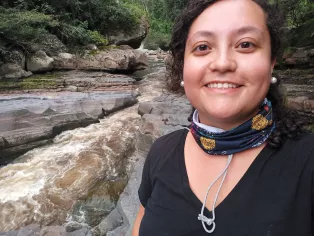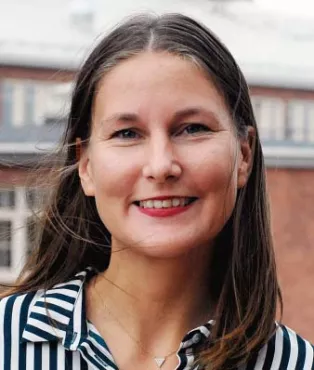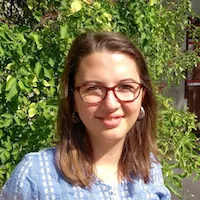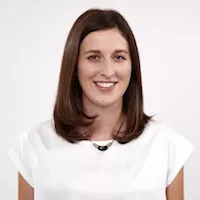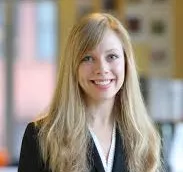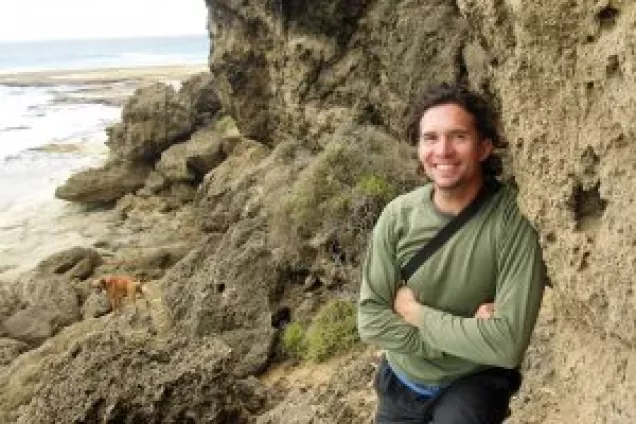Meet LUMES Graduates
Interviews with LUMES graduates from 2010-2023
Meet some of our graduates from across the globe, find out what they are working with today and what they consider to be the most valuable skills they gained from the LUMES programme.
Laura Betancur Alarcón, Batch 21
Current position:Phd-student.
Laura Betancur Alarcón is a PhD-student at the Humboldt Universität zu Berlin at the Integrative Research Institute on Transformations of Human-Environment Systems (IRI THESys). She investigates social-ecological relations in the Magdalena basin in Colombia, especially focusing on rivers that were dammed in the 1980s and 2010s. She is interested in researching and telling stories about how societies can improve the way they value, understand, and co-live with rivers and amphibian landscapes.
What were the most important skills you learnt in the LUMES programme?
The LUMES programme was a very transformative time in my life, both professionally and personally. In short, I could say that the most important skill was the solutions-oriented perspective on research and professional practice. Those continuous questions about: why we do what we do, and what type of change we want to drive.
I could say that the most important skill was the solutions-oriented perspective on research and professional practice. Those continuous questions about: why we do what we do, and what type of change we want to drive.
Sometimes, it’s difficult to disentangle what were the exact situations or factors that shaped that “LUMES” perspective on social-ecological issues.It could have been a comment from an Italian friend during lunch about sustainable diets, the reflections of your biologist classmate on oceans’ health, or joining voices in a climate demonstration. Certainly, it was all together.
In that sense, I guess another great skill the programme left me with is the ability to communicate across cultures and disciplines.
What career advice do you have for LUMES students?
After LUMES, many of us ended up with very interdisciplinary backgrounds and skillsets. Hence, my advice would be: don’t be afraid of not fitting into the box of some positions or institutions. On the contrary, communicate about your diverse sets of skills and perspectives. Harness the potential of your previous experiences and your own journey to future employers.
Sara Törnros (Sweden), Batch 17
Current position: Climate change and resilience advisor at Plan International
Sara Törnros works as a Climate change and resilience Advicor at the international NGO, Plan international. In her role as an advisor she gives support to development and humanitarian programmes across three continents; policy and advocacy work; develop new programme tools and models; provide trainings; and lead and advise on research initiatives.
What were the most important skills you learnt in the LUMES programme?
I think it was more the way of thinking than practical skills. Thinking critically across disciplines throwing in some level of complexity and just getting used to being in a room with people from such diverse backgrounds was super valuable. I think it made me more humble and open-minded – before I thought more in black and white terms, now it’s all more a spectrum of grey.
How do you use these skills today?
In my job, I meet so many people on a daily basis everything from politicians to children from low-income countries, being able to really listen and understand their perspectives is absolutely vital for us to be able to achieve lasting and meaningful change. Also, (in case anyone didn’t think so) the NGO world is full of internal politics – being able to push your agenda in that space requires you to be able to argue your case while still being humble and pragmatic at the same time as you need to build strong relationships – all the discussions in the classroom definitely helped me prepare for that.
Lucia Di Paola (Italy), Batch 22
Current Position: Just Transition Officer
Lucia Di Paola graduated from LUMES in 2019. Today she works as Just Transition Officer at ICLEI Europe, a network of cities for sustainability, who works with local governments to promote local action, as well as with EU institutions to drive sustainability policies.
Lucia is part of the Governance and Social Innovation team, and her work focuses on the intersection between social justice and urban sustainability.
How did the path towards your current occupation look like?
Before LUMES, I studied a bachelor in European Studies and then I worked for Zero Waste Europe, in Brussels. This helped me a lot to understand how European environmental policy works and how it has a real impact on the ground. LUMES, took me a step forward. I learned about the interlinkages between broader systems, from the economy to shared worldviews and values, and how justice plays such an important role in creating a truly sustainable world.
In LUMES, I got inspired by the course on Urban and Rural systems, and how exclusion and disparities in cities can have a negative impact on the very much needed ecological transition. I wrote my thesis on green gentrification in Milan in collaboration with the Barcelona Lab for Urban Environmental Justice and Sustainability (BCNUEJ), which I got to know through a seminar organized by a LUCSUS professor. I wrote the BCNUEJ an email, asking them if they would help me develop my research. They said yes! I am proud of how the thesis turned out and when I came across ICLEI's open position, it was clear to me that this reflected well my thesis topic and my LUMES background. I applied and got the job.
Sophia Speckhahn (Germany), Batch 19
Current position: Project Manager at WWF
When Sophia Speckhahn graduated in 2017, she found the transition to professional life quite lonely, and missed the community at LUMES. But in her new profession as a project manager at WWF– working with youth and education – she soon found a new community full of life and activities.
As project manager at WWF Germany, Sophia develops and manage educational activities related to sustainable development and societal transformation processes. She's also involved in the international activities of WWF's education and youth work, where she plans and facilitates different events, such as a sustainability festival, trainings and workshops.
What skills did you get from the LUMES programme?
LUMES provides you with an overview of a range of sustainability issues, you don’t become an expert in a certain issue, but you get a wide understanding of sustainability and are able to understand causal relationships, connect the dots and see the bigger picture. You also learn to be critical and reflect on different sustainability issues from different angles.
The unique group spirit with individuals from diverse countries and backgrounds allows for a change in perspective and makes you rethink priorities and challenges your perceptions of the world around you.
How are these skills important for your work today?
I’m working with young people who are often very critical and want answers to their questions and requests. I can help them develop this critical thinking and make them understand the complexity of things while giving them a broader understanding of sustainability issues in practice and empower them to take action. I also benefit from the experience with international and diverse working groups and got more sensitive to group dynamics, which is valuable in working with students as well as other professionals.
What career advice do you have for LUMES students?
Be open to different opportunities, career pathways and jobs, but be true to yourself and what matters to you. Stay connected to the LUMES network, other alumni can be very valuable, both personally and professionally, when finding a job and during your career.
Annabel Schickner (Germany), Batch 19
Current position: Sustainability consultancy at the consultancy company akzente, Germany
After graduation Annabel secured an internship at GIZ, the German national development agency. During her internship she started to apply for jobs, and in autumn 2018 she started working at a sustainability consultancy, where she advises companies and organisations on how to be more sustainable.
Today, Annabel Schickner work as a sustainability consultant at the consultancy company akzente in Berlin. In her work she writes sustainability reports for companies and provides them with strategies on how to improve on sustainability issues and how to communicate their work.
What were the most important skills you gained from the LUMES programme?
Besides the actual knowledge in sustainability and the systems thinking, the most valuable skill I got from the LUMES programme was the ability to work together with people from different disciplines, backgrounds and nationalities.
How are these skills important for your work today?
For me as a consultant, it is important to have a broad knowledge of sustainability since I work with companies from many different sectors. Teamwork is also important in my job – which is something I really got to practice in the LUMES programme.
What advice do you have for current LUMES students?
What you learn at LUMES is about so much more than getting a job, you learn for life. Don’t worry too much about what will happen after graduation. Enjoy your studies while you are here. The two years at LUMES was the best years of my life. I never learned so much in such a short time.
Emily Norford (USA), Batch 17
Current position: Policy Officer at EAT Foundation, Norway
Emily Norford works as a policy officer at an international policy advocacy and network organisation, called EAT Foundation, where she supports the foundation’s goal in transforming the global food system to become more healthy and sustainable. Her work ranges from drafting policy related materials to setting up or supporting initiatives.
What skills did you gain from the LUMES programme?
In my work, I take part in organsing events such as different conferences. For example, I help in the planning of organising break-out sessions at a conference that involves everything from curating topics to setting up partnerships with a variety of organisations. In this process, it is often difficult to reach an agreement on a specific issue, especially when team members disagree due to their own disciplinary assumptions. In those situations, it is beneficial to have experience from LUMES, such as being able to engage in discussions, question assumptions and, eventually, arrive at solutions.
Javier M Blanco (Spain), Batch 17
Current position: Policy Officer, United Nations Development Programme, UNDP, Panama
Javier Blanco works with various tasks relating to national policy development and SDGs with focus on poverty reduction and human development. Javier Blanco started his policy career with internships at the Earth System Governance Project and the Food and Agriculture Organisation of the United Nations, FAO, during and after LUMES.
What skills did you gain from the LUMES programme?
Both at FAO and UNDP, we work in the field with people from governments, NGOs and other places. They come from different backgrounds and cultures, usually with a lot of expertise. Here, the general ability to understand, communicate and manage knowledge from different disciplines is something that is useful and a skill that I developed in LUMES.
Gavin McCrory (UK), Batch 18
Current position: PhD Student, Chalmers University of Technology, Sweden
After graduation, Gavin worked as a junior researcher on a smart cities project at Vrije Universiteit Brussels in Belgium. This experience, combined with his master thesis, enabled him to go on to secure his PhD position.
Gavin McCrory is currently a PhD candidate at Chalmers University of Technology. His research is focused on urban living labs and sustainability transitions and he seeks to generate impactful, reflexive, and change driven research. His research interest was developed during his time at LUMES and explored in depth in his master’s thesis.
What skills did you gain from the LUMES programme?
LUMES provided me with a set of skills and experiences that are relevant, useful and desirable for my current work. The open and encouraging environment that is conducive to developing group competencies, and abilities in critical, reflexive and holistic thinking are some of the competences I values the most.
Jorge Castro (Guatemala), Batch 14
Current position: Sustainability Developer, IKEA, Sweden
Jorge Castro started his first employment in Sweden with Boozt Fashion where he did product and logistical work building on his previous knowledge as a mechanical engineer. After gaining experience with Swedish language and getting comfortable with the company, he moved to the UK where he worked at the Melton Borough Council, a government administration agency. There, he supported the sustainable development of rural local businesses of the food and drink industry. These working experiences, in addition to the theoretical knowledge he gained through LUMES, equipped him with the necessary skillset to start working in his current role at IKEA.
At IKEA, Jorge Castro works as a sustainability developer to improve the social, economic and environmental performance of the company. He is also responsible for overviewing and assessing that changes in performance is implemented and realised through various initiatives and programmes.
What skills did you gain from the LUMES programme?
LUMES was unique because as an individual, it encouraged critical thinking, and as a team member, it allowed for the ability to harvest and foster best skills of people from different cultures and different backgrounds and for us to develop."
If you can link the relevance of LUMES skills to specific achievements that you gained and show how it translates to the job you’re applying to – then you will shine.
“LUMES is so much more than a masters program, it's an experience! When I look at my classmates, past and present, I see the future of sustainability and know there is hope for the planet and future generations.
Chad Stephen Boda, LUMES Graduate 2012
By studying LUMES I feel enabled to understand and contribute to the solution of complex sustainability challenges.
Ralf Bilke, LUMES Graduate 2012


